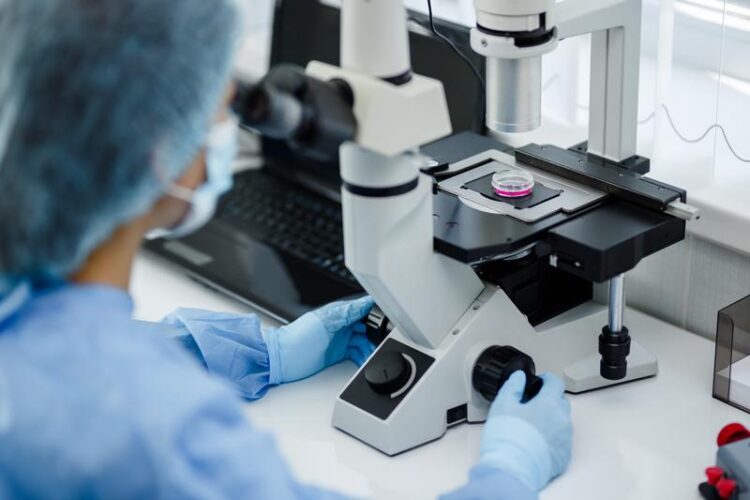Inflammatory response in blood driving factor

Researchers analyse data from more than 500 patients with gastric cancer.
Colourbox
… in advanced tumour disease.
What factors influence the life expectancy of patients with advanced gastric cancer? Scientists at Leipzig University Hospital have discovered that the body’s inflammatory response is accompanied by reduced muscle quality in patients and ultimately constitutes the decisive factor for the prognosis. Their results have been published in the “Annals of Oncology.”
A research group at Leipzig University Hospital, led by Professor Ulrich Hacker, together with scientists from Masaryk University in Brno, Czech Republic, has investigated what influences the life expectancy of patients with advanced gastric cancer. The evaluation included data from over 500 individuals who had been treated within a clinical trial several years ago.
Their analysis used certain values in the blood that indicate an inflammatory response in the body, as well as measurements of muscle quality. “From our findings, it can be concluded that in aggressive, advanced tumour diseases, as exemplified by gastric carcinoma, the inflammatory response in the blood is the driving factor for disease progression. This is closely related to the development of sarcopenia, a loss of muscle mass and quality,” explains Professor Hacker, senior physician at Leipzig University Hospital. The physicians also found that in patients who underwent chemotherapy as part of the trial and in whom the disease had not progressed further, the inflammation level measured in the blood decreased significantly.
When it comes to prognosis, scientific discussions have so far attached great importance to muscle parameters. This has given rise to the hypothesis that measures to improve tumour patients’ muscles could in turn improve their life expectancy. At least for advanced tumour diseases, as in the present study, it now appears that the inflammatory response is a leading factor.
“We demonstrate that blood inflammation levels and sarcopenia are closely related. Contrary to our findings in a previous study, we now know that muscle quality is not a decisive factor for the life expectancy of patients with advanced gastric cancer,” Professor Hacker explains, summarising the key message of the research. He adds: “Influencing the inflammatory response is emerging as a key target to improve both prognosis and sarcopenia.”
To treat sarcopenia, experts often suggest physical training and, above all, dietary changes. “However, it is also known that dietary changes do not work well when elevated inflammatory markers are detected in the blood. This new study data suggests that effective tumour therapy reduces inflammatory responses, which could lay a good foundation for effective nutritional interventions,” says Professor Hacker. Future studies would have to clarify whether the findings could be transferred to other tumour types and how different tumour therapies or other treatments affect inflammatory responses in the blood.
Wissenschaftliche Ansprechpartner:
Professor Ulrich Hacker
Department of Oncology, Gastroenterology, Hepatology,
Pneumology and Infectiology at Leipzig University Hospital
Phone: +49 341 97 12566
Email: ulrich.hacker@medizin.uni-leipzig.de
Originalpublikation:
Original title in “Annals of Oncology”: “Modified Glasgow prognostic score (mGPS) is correlated with sarcopenia and dominates the prognostic role of baseline body composition parameters in advanced gastric and esophagogastric junction cancer patients undergoing first-line treatment from the phase III EXPAND trial” doi:10.1016/j.annonc.2022.03.274 https://doi.org/10.1016/j.annonc.2022.03.274
Media Contact
All latest news from the category: Health and Medicine
This subject area encompasses research and studies in the field of human medicine.
Among the wide-ranging list of topics covered here are anesthesiology, anatomy, surgery, human genetics, hygiene and environmental medicine, internal medicine, neurology, pharmacology, physiology, urology and dental medicine.
Newest articles

Innovative 3D printed scaffolds offer new hope for bone healing
Researchers at the Institute for Bioengineering of Catalonia have developed novel 3D printed PLA-CaP scaffolds that promote blood vessel formation, ensuring better healing and regeneration of bone tissue. Bone is…

The surprising role of gut infection in Alzheimer’s disease
ASU- and Banner Alzheimer’s Institute-led study implicates link between a common virus and the disease, which travels from the gut to the brain and may be a target for antiviral…

Molecular gardening: New enzymes discovered for protein modification pruning
How deubiquitinases USP53 and USP54 cleave long polyubiquitin chains and how the former is linked to liver disease in children. Deubiquitinases (DUBs) are enzymes used by cells to trim protein…



